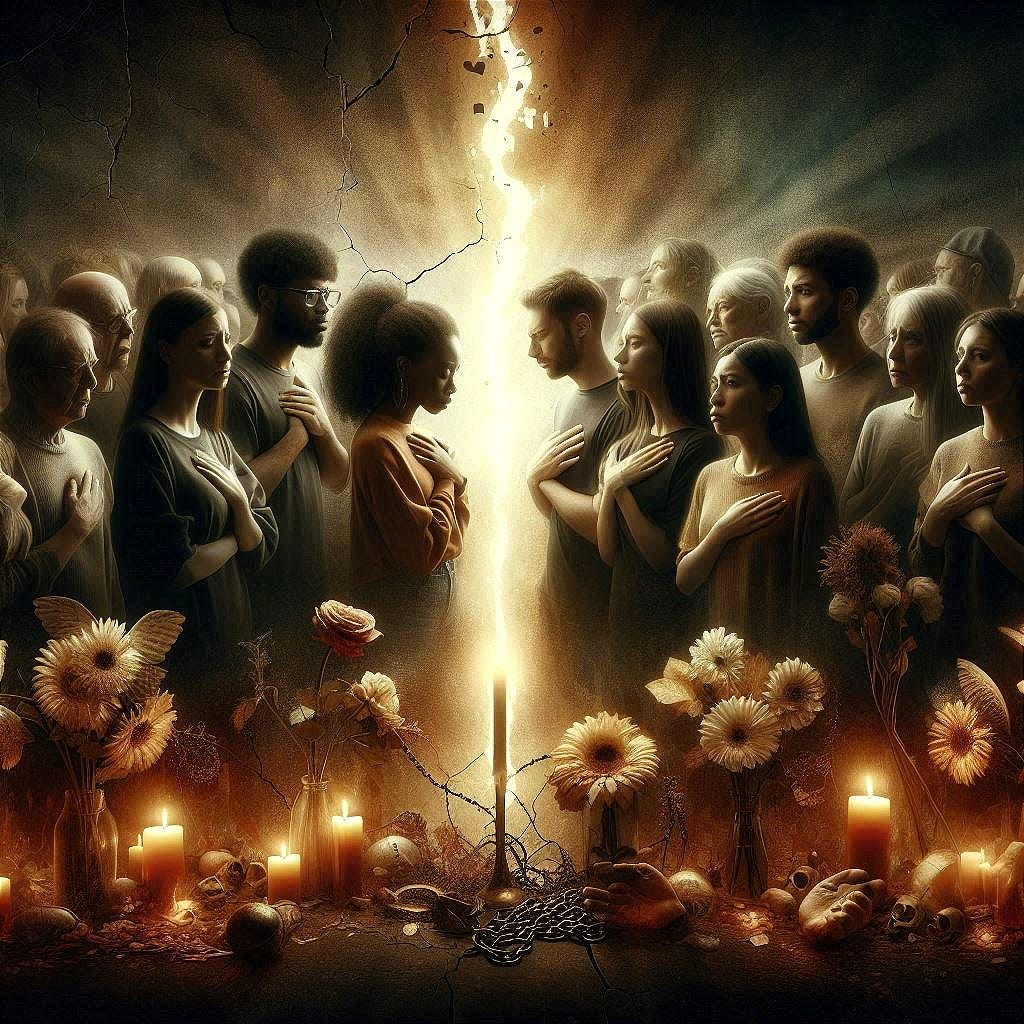We carry the power to feel deeply, and that is not weakness—it is one of the greatest strengths of our shared humanity.
When we allow ourselves to feel sorrow, when we stop running from the discomfort of pain, we step into a sacred process of transformation. Lament is not a detour from healing. It is the doorway. It is not the opposite of hope—it is the ground from which real hope grows.
Many of us have been shaped by cultures that reward productivity, positivity, and quick resolution. We’re taught to stay strong, keep moving, or fix it fast. But the soul does not work that way. Grief that is unspoken festers into disconnection. Anger that is buried becomes bitterness. Pain that is ignored distances us from others and from ourselves.
There is immense courage in pausing long enough to say: this is not okay. In naming the injustices, betrayals, and harms that have scarred our lives and our communities, we give witness to their weight. We honor those who suffer. We tell the truth. And telling the truth is the beginning of liberation.
Lament is not about despairing endlessly. It is about choosing to feel, so that numbness does not define us. It is about making space for the fullness of our response to evil, so that our hearts are not hollowed by silence.
When we lament, we open ourselves to one another in vulnerability and solidarity. We shed our armor. We confront complicity. We remember that transformation is possible—but only when rooted in truth.
You are allowed to mourn. You are allowed to grieve what was lost, what was broken, what was taken. And in doing so, you reclaim your power to imagine something different. Something better.
Healing begins in the ache. Lament carries us there, not to leave us in sorrow, but to plant within us the seeds of change.
Some days, it’s easier to feel nothing. To scroll, to work, to smile on the outside while inside there’s a quiet ache you can’t quite name. The world is heavy. The injustice overwhelming. We witness pain, and yet we’re expected to stay composed, move forward, and keep functioning.
Over time, we grow tired of pretending. Tired of the silence. We feel the weight of knowing and not speaking. Seeing and not acting. And deep inside, we carry the question: How can things ever truly change?
This is not just personal—it’s collective. Our systems, institutions, and histories are built on unresolved wounds. Layers of oppression, complicity, and silence have taught many to normalize harm, to turn away from sorrow, to avoid the discomfort of truth.
But there’s something in us that resists this numbing. A longing that persists. A knowing that life is not meant to be endured passively. This knowing is sacred. It whispers: you are made for more. You are made for wholeness, for belonging, for justice that doesn’t require forgetting.
It is not weak to feel broken by the brokenness of the world. It means your heart is still alive. That your humanity is intact. That the possibility of transformation is still burning inside you.
Change begins when we honor that pain—not rush to erase it. When we learn to lament together, we create space for something deeply human: a shared path forward. Not built on false unity, but forged in the fire of truth-telling and grief.
Hope is not shallow optimism. It is the quiet strength to sit with sorrow and still believe in healing. It is the choice to stay present, even when things are raw and unresolved.
You are not alone in your ache. Let it guide you—not into despair, but into deeper connection with others who are grieving, resisting, and dreaming of a new way.
Stand in that space. Own your sadness. Let it call you into solidarity. Let it move you toward healing that honors all that has been lost.
Deeper Reflection:
What truths have you avoided naming, and what might change if you allowed yourself to mourn them?
Heart of the Message:
Lament is a necessary spiritual and communal response to injustice, atrocity, and complicity. It paves the way for healing, transformation, and authentic hope by confronting suffering with truth and courage. The resurrection of the church begins with lament.
We stop, finally,
at the edge of what we can no longer pretend not to feel.
A silence filled with grief becomes our truest prayer.
No slogans. No quick answers.
Only the ache
of what has been broken—
in us,
among us,
by us.
And there,
in the stillness of shared sorrow,
something ancient stirs.
Not a fix.
But a fire.
Not escape.
But a return
to all that matters.
And we rise, not in spite of the pain,
but because we have faced it.
Together.




